Bluetooth temperature data logger with high sensitive external sensor can display real-time data. This temp data recorder can store history data for data comparison, easy to use and convenient for shipping, vaccine storage and cold chain.
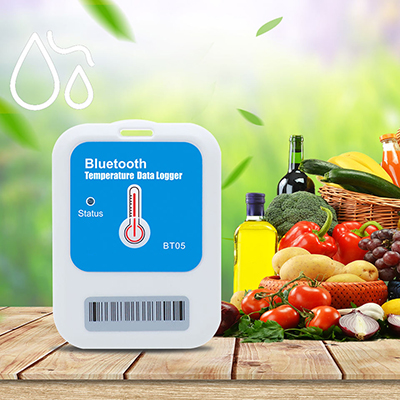
Temperature data logger with Bluetooth and external probe
- High accuracy and stability.
- With Bluetooth 4.1 (Nordic Chip).
- Long distance wireless transfer.
- External highly sensitive temperature sensor.
- Temp data recorder can display real-time data.
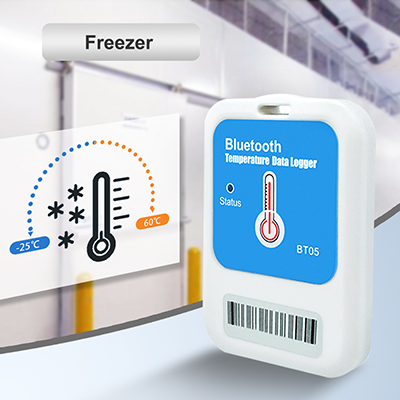
Bluetooth temp data logger can store history data
- This data logger can store 12000 pieces of temperature data.
- History report can be sent to specified email.
- LED light indicating for different status.
- Temp data recorder can choose time to query data, every time query of data, the stored data can be saved in history.
- It can set normal storage temperature data interval and alarm storage temperature data interval.
How to use the software on Android/IOS?
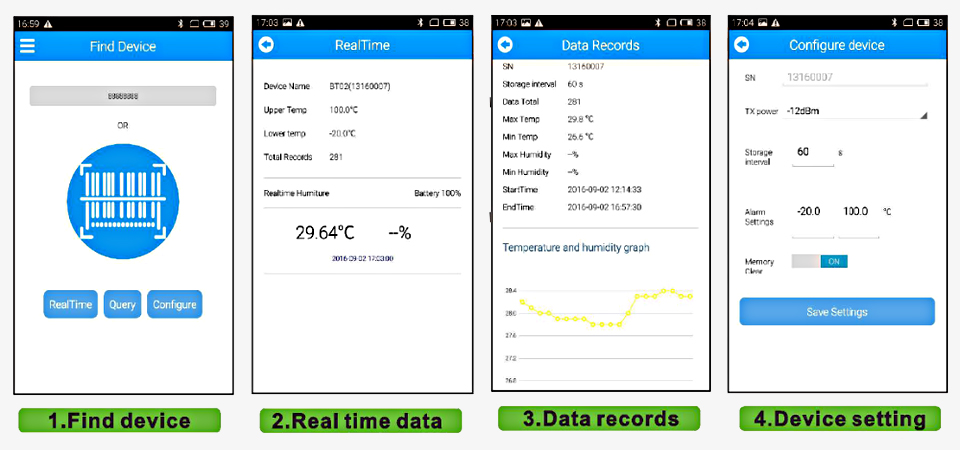
- Find device. Scan the barcode on device with this software.
- Read time data. Check the real time temperature data on phones, you can see device name/temperature value/battery level.
- Data records. Check the historical records with a graphic information.
- Device setting. Set the device as you like on TX power/storage interval/alarm setting/memory clean.
Applications
Bluetooth temperature data logger is mainly used for temperature mapping during storage, shipping and transportation of vaccines, food, medicine, chemicals and other products.
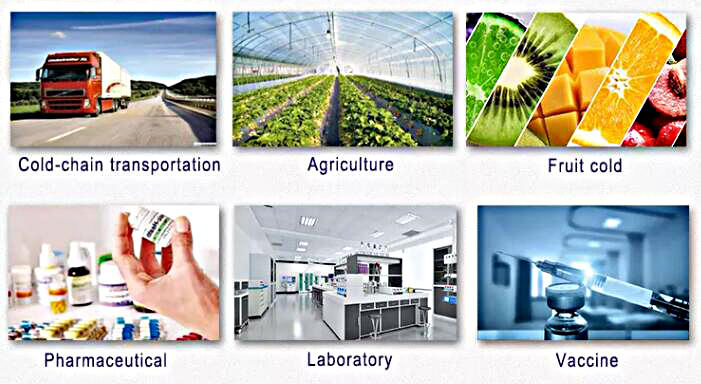
| Model | SISCO-TDL-BT05B |
| Dimension | 66mm*48mm*10mm |
| Net Weight | 25g |
| Signal Transmission Frequency | 2.400 - 2.4835GHz |
| Protocol Standard | Bluetooth 4.1 |
| Modulation Mode | GFSK |
| Send Interval | 2s (default) |
| Built-in Battery | Panasonic CR2450, 620mAh/ 3V |
| Output Power | -4dBm, Adjustable |
| Communication Rate | 1Mbps |
| Transmission Distance | 55 meters, Adjustable |
| Storage Capacity | Can save 12000 Temperature Data |
| Battery Life | 1.5 Years (Depends on the mode of operation) |
| Operating Temperature Range | -25℃~+60℃ |
| Detecting Temperature Range | -40℃~+80℃ (Just for the temperature sensor) |
| Temperature Detection Accuracy | ±0.5℃ (-20℃~+40℃), ±1℃ (Others) |
Dimension
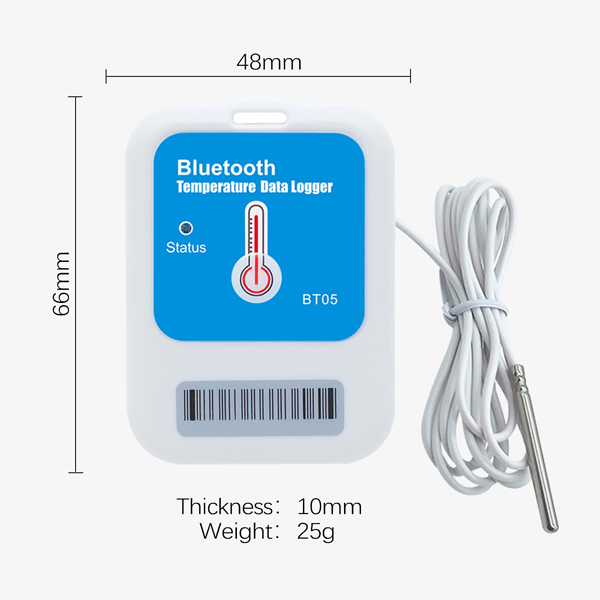
Q1: What is a temperature data logger?
A1: A temperature data logger is one of the types of temperature measuring instruments. With the popularization and wide application of computers, temperature data recorders have been produced. And because of its more accurate data recording, more convenient data storage, and more convenient data analysis functions, it has been widely used. Paperless temp data logger with USB interface also greatly facilitates the downloading and saving of data.
Q2: What are the functions of temperature data loggers?
A2: Measurement: Built-in temperature sensor or connectable external temperature sensor to measure temperature.
Record Storage: Automatically record and store measured temperature values.
Data transfer: transfer or download the saved measurement data to the computer through the USB interface.
Programming: such as setting sampling rate, data transmission method and interval, selecting temperature sensor type, alarm setting, etc.
Analysis: Perform the necessary analysis on the temperature data through the built-in software.
Q3: What are the advantages of temperature data loggers?
A3: The portable temperature and humidity data logger can regularly collect and record temperature and humidity parameters according to the configured time interval, and can transmit the collected and recorded data to the computer for processing and drawing charts. It is widely used in environmental protection, health and epidemic prevention, warehousing and transportation, museums, greenhouses and other fields. This recorder is powered by high precision sensors and high-energy lithium batteries. It is designed with low-power technology and requires no external power supply. It is small in size, low in power consumption, and high in precision. It can work continuously for more than three years.
Tips: Bluetooth temperature data logger application
- Cold chain logistics: In the process of cold chain transportation, the use of temperature and humidity recorders can monitor the temperature of the entire logistics process to ensure the temperature, and can also provide data recording, over-standard alarm and reporting services to ensure that the transported goods can be successfully accepted by customers. It improves the ability of logistics enterprises to control temperature and humidity and improves the competitiveness of enterprises.
- Pharmaceutical industry: The increase in drug safety issues and medical accidents has attracted great attention from relevant departments, and has begun to increase supervision. Therefore, drug storage must be controlled according to the corresponding temperature and humidity to ensure the safety and reliability of medical devices and drugs. According to the latest GMP certification, the temperature storage range for general medicines is 0~30℃.
- Laboratory field: In the fields of medicine, biochemistry, instrument calibration, agriculture, construction, etc., laboratory environmental conditions directly affect the results of various experiments or testing, and each experiment requires accurate and reliable monitoring instruments to provide accurate and reliable monitoring. Environmental parameter data.
- Food industry: Temperature and humidity are a crucial part of food storage. Bad changes in temperature and humidity will bring about changes in food quality and lead to food safety issues. The monitoring of temperature and humidity is conducive to the timely monitoring and control of the food safety system by relevant personnel.
Thank you for buying industrial test and measurement equipment on SISCO.com, all products sold by SISCO and the partner cover a 12 months warranty, effective from the date of receiving the products.
What is covered?
SISCO is responsible for providing free spare parts, and free technical support to assist the customer to repair the defective products until the problem is solved.
What is not covered?
- Product purchased from anyone other than a SISCO store or a SISCO authorized reseller.
- Expendable parts.
- Routine cleaning or normal cosmetic and mechanical wear.
- Damage from misuse, abuse or neglect.
- Damage from use of parts other than SISCO approved.
- Damage from use outside the product’s usage or storage parameters.
- Damage from use of parts not sold by SISCO.
- Damage from modification or incorporation into other products.
- Damage from repair or replacement of warranted parts by a service provider other than a SISCO authorized service provider.
- Damage caused by the application environment not meeting the product usage requirements and the failure to perform preventive maintenance.

